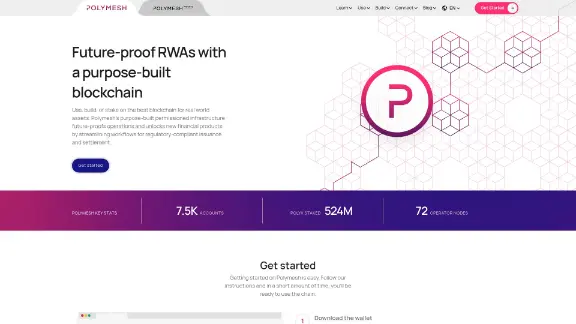Polymesh (POLYX)
Polymesh is a blockchain specifically crafted for regulated assets, offering a specialized infrastructure tailored to modern capital markets. It was developed by Polymath, a platform that facilitates the creation, issuance, and management of security tokens on the blockchain. Trevor Koverko is one of the co-founders of Polymesh.
Overview
Polymesh is a permissioned blockchain designed for regulated assets, emphasizing identity, compliance, confidentiality, and governance. By integrating regulatory requirements into its core design, Polymesh streamlines outdated processes and supports new financial instruments. This specialized infrastructure addresses gaps in Ethereum's architecture, meeting the needs of modern capital markets.

| Ticker | POLYX |
| Category | Smart Contract Platform |
| Website | https://polymesh.network/ |
| @PolymeshNetwork | |
| https://www.reddit.com/r/PolymathNetwork/ |
Architecture
Polymesh is a public, permissioned blockchain optimized for regulated assets and markets, focusing on governance, security, and consensus. Built on the Substrate framework, Polymesh allows anyone to run a node to verify network rules, but only certain entities, called operators, can author and finalize blocks. The blockchain features the native token POLYX for security and payments. It supports base layer primitives and Layer 2 smart contract logic, with smart contracts compiling to WebAssembly (Wasm) and using ink!, a Rust subset designed for Substrate-based chains. Polymesh was designed specifically for regulated assets and global capital markets, guided by its four key pillars: Identity, Governance, Confidentiality, and Compliance.
Identity
Identity is a fundamental aspect of Polymesh, implemented through a federated root of trust with permissioned Customer Due Diligence service providers. Every transaction on Polymesh is linked to an identity managed through decentralized identifiers (DIDs). These identities enable real-time compliance enforcement for asset issuers and allow users to manage their on-chain identities through key management. Multiple on-chain identities can be created by an entity, helping to maintain confidentiality of overall positions.
Governance
Polymesh's governance system is structured to facilitate the chain's growth and development by integrating input from the broader community, technical committees, and a governing council to implement proposals. Any network user can propose Polymesh Improvement Proposals (PIPs), including network upgrades and consensus and security parameters adjustments. The governance mechanism is designed to become more decentralized over time.
Confidentiality
Polymesh ensures user privacy in securities transactions through confidentiality features. The MERCAT protocol was developed using homomorphic encryption and zero-knowledge proofs to enable confidential asset transfers. Future updates will integrate confidential assets into Polymesh using this protocol with ongoing research to enhance confidentiality for various securities use cases.
Compliance
Polymesh supports claim-based compliance within its base layer, allowing asset issuers to establish rules regarding the claims investors must have attached to their identities to send or receive assets. These rules can be customized and combined to create complex transfer restrictions tailored to the asset's type, jurisdiction, and regulatory requirements.
Polymesh Private
Polymesh Private is a private-permissioned version of the Polymesh blockchain designed for entities needing enterprise-grade blockchain technology in controlled environments. It offers a secure platform for blockchain solutions, particularly useful in regions with unclear regulations on public Distributed Ledger Technology (DLT) for regulated assets. Polymesh Private provides tokenization features with enhanced privacy and control, allowing compatibility with the public network and easy migration while ensuring compliance and access to ongoing updates and tools.
Governance
Entities can form consortiums or independently operate Polymesh Private instances, configuring and deploying them within a private network with restricted access. The managing entity controls on-chain governance, decides on node operators and transaction participants, and can manage governance actions through committee voting or administrative keys/multi-sig wallets. The chain operator also retains full control over the implementation of on-chain upgrades.
Confidential assets
Confidential Assets in Polymesh allow users to maintain the privacy of asset balances and transaction amounts while transacting on a shared global ledger. These assets offer features designed for regulated markets, including issuing and redeeming assets, implementing atomic settlement instructions with counterparty affirmation, involving mediators and auditors for transaction approval and oversight, and allowing issuers to freeze transfers across all accounts or specific confidential accounts.
Settlement
Confidential Assets on Polymesh are transferred using Settlement Instructions, which involve multiple transfer legs representing asset exchanges between a sender and receivers' confidential accounts. These instructions are executed atomically, meaning all transfers succeed or fail simultaneously once all parties affirm. Transfers can range from single asset transfers to bilateral exchanges or netted settlements. To ensure transaction validity, the sender must provide zero-knowledge proof, verify on-chain, confirm they have sufficient funds, transfer a positive amount, and that the receiver's balance will reflect the transfer.
POLYX
POLYX is Polymesh's native token, used for staking, governance, and transaction fees within the network. It is created through block rewards and can be held by any Polymesh key, but keys with a valid Customer Due Diligence claim can only be transferred. POLYX can be staked for block rewards, and operators may need to stake a minimum amount to run an authoring node.
Tokenomics
POLYX has no fixed maximum supply, with new tokens minted at the end of each era to reward operators and stakers as part of the Proof of Stake consensus protocol. The Rewards Curve governs the minting rate, capped at 140 million POLYX annually. Rewards for operators and stakers on Polymesh fluctuate based on the amount of POLYX being staked. The ideal staking ratio is 70% of the total POLYX supply but can be adjusted through governance.
Partnerships
Polymesh has formed partnerships with various organizations, including:
- ABC Tokens
- BDACS
- Binance
- Black Manta Capital
- Dfns
- DigiClear
- DigiShares
- Etana Custody
- Fractal
- Jumio
- Korea Digital Asset Custody (KDAC)
- Marketlend
- NayaOne
- NetKi
- Nova
- OTC Digital
- OCL
- Polymath
- REtokens
- Radium Block
- Raze
- Sors
- Stably
- TokenTraxx
- Tokenise
- TaroFi
- Zondax
